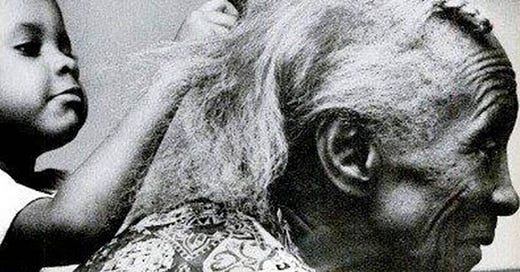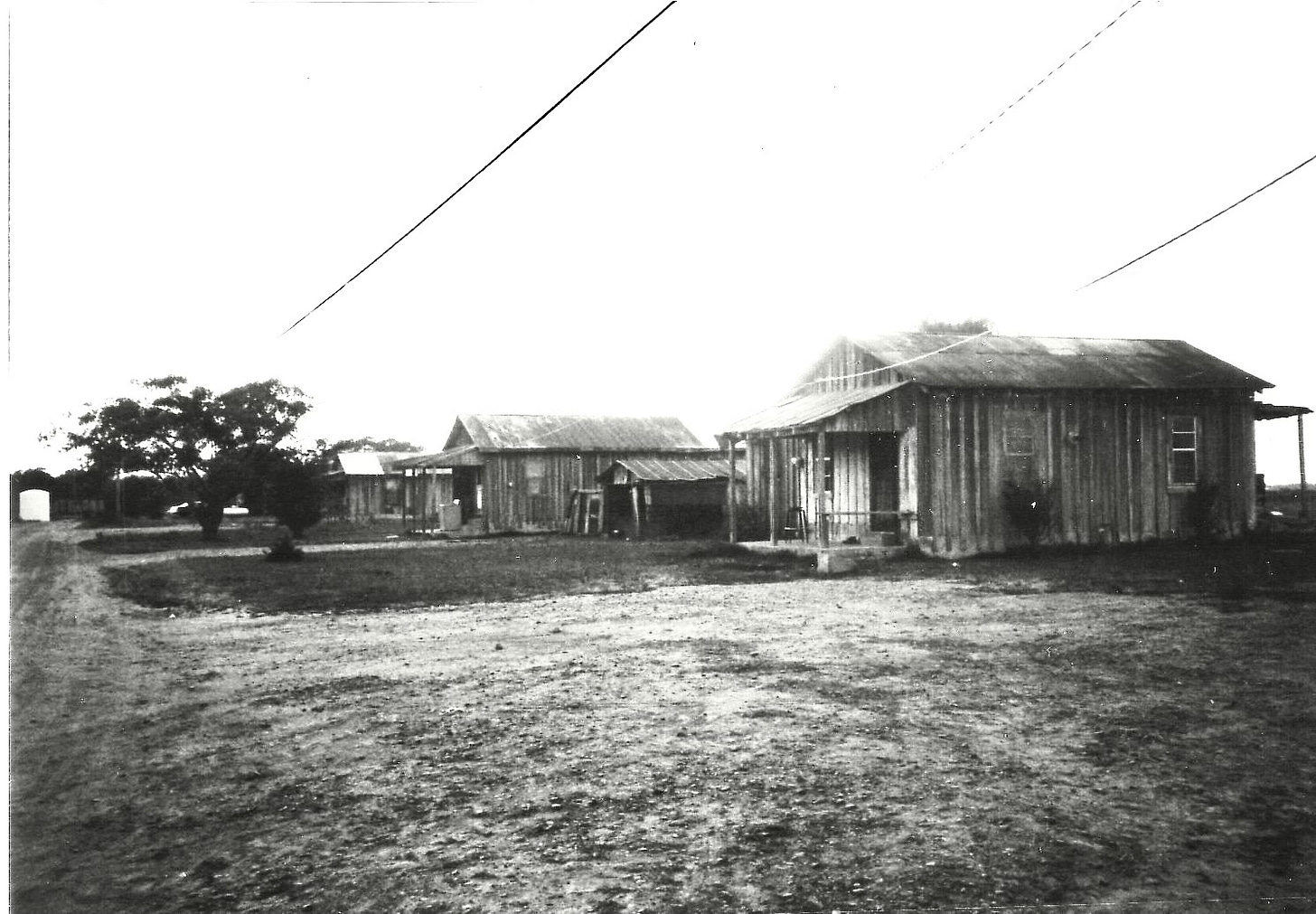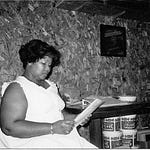This piece marks a departure from the essays and memoirs I’ve shared with you so far. “Swap Dog Kin” is a chapter from a novel I set aside years ago and have recently begun rewriting. From time to time, I hope to share additional chapters—though not necessarily in order. Still, I intend for each to stand on its own as a story worth your time.
Evening draped itself over the settlement of former slave cabins like a worn patchwork quilt—familiar, frayed, and full of ghosts. As they did most nights, Violet dragged her grandmother’s split-bottom rocker out onto the porch, then settled herself on the top step while the old woman eased into her seat with a sigh. Together, they watched the day as it let go its heat.
Maids and cooks and yard workers trudged down the hill from the stately homes in Delphi where they toiled. Field hands dusted the day’s labor from their clothes. Picking season was nearly over, and the colored school would reopen soon. But Violet, usually quick to look forward, felt no stir of excitement.
Her thoughts were heavier than usual, full of shadows.
Since coming to live with Granada Satterfield—known to everyone as Gran Gran—Violet had learned this: her porch was a refuge. A shelter for the broken and the wandering. People brought their sick babies, their worn-out prayers, their secrets too heavy to bear alone. And not just people. Half-starved dogs stumbled in, ribs showing. A blind mule, long abandoned and disoriented, had once wandered down the hill. Even a red fox with the staggers, and all manner of beasts wandered off the big road and down that hill. Lost, abandoned, hurting, every troubled creature in this big old suffering world seemed to find its way into the care of the old woman. The men tried to shoot that fox, claiming it had rabies, but Gran Gran shamed them all by catching the poor animal with only a broom and a quilt and nursed it back to health. Still came around now and then for a visit and, knowing better than to bother the chickens, waited patiently under the house for table scraps.
Violet herself had been a stray of sorts, a suffering creature for sure, orphaned and brought down that hill and folded into the old woman’s life. And like Violet, most who sought out the lady, two legged or four, seemed to be better off for it.
What troubled her now were the ones Gran Gran couldn’t help. The ones sent back into the world, unwell, unclaimed, unloved.
The old woman glanced at her, quiet for a long moment. Then, her voice rough and soothing all at once: “What’s troubling you, child?”
Violet exhaled—an old soul’s sigh in a young girl’s chest.
“Remember that baby?” she asked. “Name was Solomon. His daddy didn’t even want to claim him.”
Gran Gran’s jaw set. “I remember. Been near about four years past. You worrying over him?”
Violet nodded. She’d never stopped. He was in her prayers every night.
It was not long after she first came. A cold, damp afternoon and Violet was still grieving her mother. A truck came growling down the hill, dogs snarling in the bed. A tall man stepped out, wrapped in an oilskin coat down to his boots, a hunting knife strapped to his belt. But what Violet remembered most was the hat. She had never seen a derby before. To a child’s eyes it looked like a scoop of chocolate ice cream. Stuck in the band was a hawk feather longer than a man’s hand.
His wife was pretty and dark like him, and she wore the most beautiful scarf the girl had ever seen, the bright red of nandina berries trimmed with a gold fringe. Violet was about to reach through the truck window and touch it but then noticed that in her arms she held a quilted bundle. Assuming it to be a sick child, Violet quickly showed the family into the kitchen where Gran Gran was peeling burdock root for her arthritis, hands steady as ever.
“Y’all got a child need tending?” she asked without looking up.
The man snapped, “Ain’t my child. Hers.”
His wife’s voice cracked sharp. “Holt, Solomon ain’t no it. He’s yours like you well know.”
Gran Gran cocked her head and squinted hard like she did when she wanted somebody to say more. She could make a stone confess if she set her face right.
The woman hesitated, took a labored breath and then told how husband thought the baby’s father was a white man.
Gran Gran said nothing. But Violet saw the storm rising behind her eyes.
Then the mother said she brought the baby to Gran Gran so she could tell her husband different. She had heard that the old lady knew everything there was to know about babies.
The mother carefully delivered the bundle into Gran Gran’s sturdy hands. When the old woman pulled back a corner of the little quilt that hid the child’s face, Violet peeked. But then sucked in a sharp breath and stepped back. The baby was white! White like fresh milk. You could put a light on him, and it would shine out his back!
Gran Gran gently lifted the eyelid of the sleeping baby and began fussing. “This ain’t no white man’s child! This here’s an albino. A beautiful albino boy.”
The woman whirled on Holt. “See? What I been telling you from the start?”
But he stood firm. “I tell you it ain’t mine. I ain’t no albino.”
Violet had never heard the word “albino” but didn’t like how the man said it, like sour milk curdling in his mouth.
Gran Gran’s patience broke. “Mister, two colored folks as dark as you can have them an albino child.” She clucked her tongue as his silliness. “Like most things in the world, you don’t need no white man for it.” She handed the baby back to his mother.
“Then fix him. Make him look like me.”
Gran Gran straightened. Her voice went to cold iron.
“Ain’t nothing to fix. He’s got your nose. Got your mouth. Lord willing, he got his mama’s good sense instead of yours.”
But the man was done listening. He let out a huff, turned on his heels and left the kitchen in a simmering rage, abandoning his wife right where she stood holding the child.
Gran Gran didn’t soften. “He’s a damn fool,” she said.
The woman looked ashamed. “It’s his mannish pride,” she defended half-heartedly. “Some folks tell him a white man must have…” She didn’t finish the thought.
Outside, the truck roared to life and there came a blast from the horn.
Gran Gran called him a damned fool again. Then she commenced to tell her everything she knew about albino children, about how he would take some extra looking after. To be careful not to let him get caught too long out in the sun because he would burn easy. To keep his skin covered. She told the woman that it would be natural if his sight turned out to be feeble so when he got older, she needed get him some smoked glasses, so the sun didn’t hurt his eyes. And to teach him an inside trade so he didn’t have to work in the fields.
After showing her how to make a salve from chickweed and beeswax to keep him from burning, Gran Gran said, “If you need me, I’ll be here to help whatever ways I know how.”
The woman thanked her and began to leave, but then Gran Gran said in a voice as serious as a graveyard, like the woman hadn’t understood it the first time, “If you need me for anything. You hear? You come to me.”
Violet had never forgotten that moment. Sudden chill in the air. The look in the woman’s eyes. The weight of knowing what it meant to be unwanted.
Now, on the porch, she asked, “Why, Gran Gran? How can a daddy not love his own baby?”
Gran Gran’s voice was low, rough with old sorrow. “Some folks ain’t got no room for nobody in this world but they ownselves. Other folks, man and woman, white and colored, are like a worn-out parcel of ground. Couldn’t root no love if they had to. It just ain’t in ‘em.”
She turned to Violet, her eyes fierce. “But hear me—it ain’t the child’s fault. Never is.”
The woman looked away toward the hill. “I do know this,” she said, heat rising in her voice, “every child of God needs to know he been claimed. A child can tell if he ain’t. It marks a child. Curses him to walk about lost in the world.”
The flat of her mighty hand slapped down hard on the arm of her rocker. “No, ma’am!” she cried. “Birthing and choosing ain’t the same thing. A child that ain’t been choosed is an orphan in his own home.”
The girl rose from the steps and lay her hand atop the old woman’s, and Gran Gran’s anger ebbed. Her voice grew somber and church-like, almost as if she were sending prayers out into the world. “Yes, Lord,” Gran Gran said, “if a child ain’t been choosed, he will move about creation, pillar to post, soul sick. So many motherless and fatherless children out there this very day, looking for home. Some die old as me before finding it. Some never do.”
Violet swallowed hard. “Miss Clytie said I’m an orphan. She told me you wasn’t really my grandmother, and it’s a lie to say you are.”
“Hush, now,” Gran Gran huffed. “That old Clytie don’t know snuff from black pepper.”
“But she called me a stray,” Violet added, tears rising. “Said I’m nothing but swap dog kin.”
Gran Gran chuckled, warm again. “Ain’t heard that in a while.”
“What is it? Don’t sound very nice.”
“Nicest thing in the world, baby. Swap dog kin means you been picked special.”
“Picked?”
“Yes. Back in slaving times,” Gran Gran said, wrapping her arms around the girl, “there were a lot of motherless children. Families torn apart and sold off—mothers from babies, sisters from brothers, man from wife. And sometimes, the only kin we had was the ones we choosed. Swap dog kin, they called it. That’s how we took care of each other when no one else would.”
She pulled Violet in closer. “When I was a little girl with no mama, Polly Shine, the old healer on Master Satterfield’s’ plantation choosed me. She was a big bug—knew healing, knew roots. Said first time she saw me, I was hers. And I was. Even after she passed, she still walks with me. Then you come along. And I choosed you. Proud I did. You and me—we swap dog kin. That makes you kin to Polly, too. We gave each other our word, and that bond don’t break. Ever.”
She leaned down, whispering into Violet’s ear. “Choosing is forever and ever, amen.”
Violet repeated the words like a prayer. “Swap dog kin.” She wasn’t a stray. She was chosen. Claimed by the wisest woman in the world.
Gran Gran nodded. “Choosing’s stronger than blood. Anybody can birth a child. But choosing? That’s a promise. That’s a home. That’s family.”
Violet’s heart ached for all the unchosen children, still wandering like ghosts.
“Gran Gran?” she murmured. “I think…I think I choosed that albino baby. Solomon.”
The old woman smiled. “Then he’s your family now, Violet. It’s the heart that does the choosing. The heart claims who it wants,” she added, “and you got to respect it. That’s what mine did the day I saw you.”
“It did?” Violet whispered. “What’d it say?”
Gran Gran laughed gently. “It leapt up and hollered clear as day— ‘I claim this here girl!’ My heart ain’t been wrong yet.”
Violet leaned into her side. The rocker creaked beneath them. The night was thick with cicadas, the air tender with heat and memory. The world could be cruel. But here, on this porch, she was known. She was loved. She was claimed.
And for now, that was enough.
Chapter 1: Swap Dog Kin
Mississippi Delta, 1936
Apr 06, 2025
Jonathan Odell - Sex, God, Race, and Mommas Podcast
I'm a Mississippi novelist transplanted to Minnesota where I have been liberalized, de-fundamentalized, come out, and learned to put the "anti" before "racist.”
I'm a Mississippi novelist transplanted to Minnesota where I have been liberalized, de-fundamentalized, come out, and learned to put the "anti" before "racist.”Listen on
Substack App
RSS Feed














Share this post